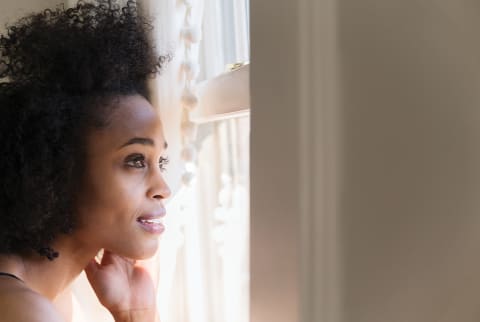Advertisement
A Few Words Of Advice On Love, Loss & A World Full Of Contradiction

Our human experience is defined by inevitable ups and downs. Change never gets easier, but we can learn to surf its oscillations and find wisdom in the contradictions which seem to underlie life's greatest meaning. Love and loss, sickness and health—nothing addresses the poles of our daily existence quite like Lost & Found, a memoir by winner of the Pulitzer Prize Kathryn Schulz. In this book, Schulz explores her relationship with her father and his passing, a marriage blossoming in the despair of grief, and a world mysteriously characterized by simultaneous joy and suffering. Given the last year and a half, we're all ripe for some words of wisdom, and this part memoir, part guidebook hits home.
Schulz's honest prose provides something everyone can relate to, as you'll find in the excerpt below. To read the full story, purchase your own copy of Lost & Found here.

Lost & Found by Kathryn Schulz
"It was like trying to dress every morning for the weather in a nation we had never heard of."
We had, by then, spent two vertiginous, elongated, atemporal weeks in the hospital. At no point during that time did we have a diagnosis, still less a prognosis. At every point, we were besieged with new possibilities, new tests, new doctors, new hopes, new fears. Every night we arrived home exhausted and talked through what had happened as if doing so might guide us through the following day. Then we woke up and resumed the routine of the parking garage and the ICU sign-in sheet and the 24-hour Au Bon Pain, only to discover that, beyond those things, there was no routine at all, nothing whatsoever to help us prepare or plan. It was like trying to dress every morning for the weather in a nation we had never heard of.
Living through the death of someone you love is such an intimate act that, inevitably, the memory of it inheres in odd, specific things: the voicemail you left for your brother that he will never hear; the television show that was on in the background when the phone with its terrible foreknowledge began to ring; the darkened windowpane in the front door, turning red and then blue and then red again from the police lights revolving silently outside it. Yet for all this variability, a kind of sameness shapes the experience of death for many of us today, because so much of it takes place in hospitals. A hundred thousand plots unfold in just one setting; it is as if we had all wandered into the same upsetting dream. And while a hospital can be, in many ways, a good place to die, it is a strange and difficult place to begin to mourn. In my many previous visits, I had always tried to temper any negative feelings I had about hospitals because I knew that wonderful things happened in them, too—that all around me, lives were being saved, pain ameliorated, hope restored, babies born. And I had witnessed some of this myself. My niece, 3 pounds at birth, terrifying in her miniature perfection: a month in the neonatal intensive care unit gave her back to us, squalling, healthy, unblemished, miraculous. My father's pulmonary artery, mended at 45, again at 60, barely so much as a scar paid either time for the price of all those extra years. I would forgive hospitals almost anything for such gifts as these.
And yet it was awful, awful and dismal, to sit in one day after day while my father was dying. It was very cold almost all of the time; I begged the nurses for extra blankets and piled them, thin and white, in threes and fours on top of my mother, who sat in a vinyl recliner at my father's side, reading or dozing and holding his hand. There was a bench seat opposite the doorway, a metal chair against the wall; I stretched out on the one or sat in the other or stood up and looked out the window. It would have been boring if it hadn't also been horrible; something extremely urgent was happening, yet there was nothing whatsoever to do. The hours were interminable but infinitely subdivided—by a machine that beeped, a phlebotomist drawing blood, someone stopping by to check the levels in the bags of fluid that hung above my father's head. From time to time, a nurse would come in, and everyone but my mother would discreetly leave the room, even though the need to do so had long since passed, modesty and privacy the least of anyone's worries anymore.
At other times, one of us would leave the room for some reason of our own, to make a phone call or go for a walk or head down to the cafeteria. In the elevator, thin old men in gowns gingerly escorted their own oxygen stands, and mothers stood like weary sentinels behind their children's wheelchairs, and brisk busy doctors went respectfully silent while the doors opened up at one floor after another, the directory on the opposite wall—neurology, nephrology, oncology, radiology, pathology, pain management, pediatric intensive care—offering up a vision of hell as thoroughgoing and carefully striated as the one that Dante gave us. Some days, there was a woman stationed in the main lobby playing the harp, a gesture I found too cloying to be beautiful, even though the fountain just outside, which rippled in a similar way and was there for a similar reason, soothed and mesmerized me. In the hallway behind her there was a bookstore with a window display full of teddy bears and beyond that the cafeteria, where, once a day or so, I wandered in circles around the offerings, trying and failing to summon any desire at all to eat.
On and on it went like this, day after day. I was conscious of how lucky we were that the era of limited visiting hours and one-guest-at-a-time policies had passed, just as I am conscious, writing this now, of how lucky we were that the era of no-guests-at-all was not yet upon us: that my father did not sicken and die during the coronavirus pandemic, when everyone's grief was compounded by isolation—by the loss, on top of everything else, of the chance to sit with your loved one and say "I'm right here." It was a privilege and a comfort to be at my father's side throughout his final weeks; if he was going to be confined to that room for so long, we wanted to be with each other, and with him.
Still, unless you work there, a hospital is no kind of place to spend so much time. Like a storefront church, its physical presence is at odds with its existential responsibilities. In an ICU, you are as aware of the brevity of life and the great looming precipice of eternity as Wordsworth was at Tintern Abbey, yet at the same time, you are basically stuck in an airport. There is the same combination of impatience and impotence; the same constant proximity to strangers; the same unavoidable dependence on professionals either kindly or officious; the same long walk to unappealing, overpriced commerce; the same creeping exhaustion that enters, like a quality of the air, almost the moment you walk through the door; the same sense of temporal dislocation, of existing in some stranded time zone distinct from all those in the outside world. In our case, because my father's condition was so mysterious, there was also the sense of being on a layover in a distant city when your flight has been canceled and no further information is forthcoming; except that, instead of waiting for a plane, we were waiting for devastation or deliverance.
